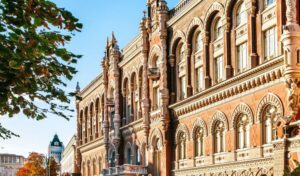Foreign trade turnover by the most important positions Jan-May 2022 (import)

SSC of Ukraine

Sales of trailer vehicles in Ukraine (new and used) in July 2022 grew by almost 2.3 times compared to the same month in 2021, AUTO-Consulting has reported.
“In July, record sales volumes were seen on the trailer market, including a significant share of new semi-trailers,” the group said on its website.
At the same time, sales of new trailers grew by 42%, and sales of used ones grew by almost 2.6 times.
As Auto-Consulting director Oleh Omelnytsky told Interfax-Ukraine, in the total number of trailers sold, new semi-trailers amounted to 369 units, trailers were 8 units.
According to the group’s analysts, such a high demand was provided by agricultural and oil companies, as well as international haulers.
The largest sales in July were provided by dump trucks-grain carriers, in second place were fuel tank carriers.
“For the first time in a month, more than 100 tanks from different manufacturers entered Ukraine,” the company said.
Increased demand was also noted for curtain side semi-trailers, refrigerators and trawls.
The German Schmitz-Cargobull became the market leader with a 21% share and a 2.4-fold increase in sales. Polish manufacturers were also active.
Turkish manufacturer Ali Riza Usta was in the lead in the segment of fuel trucks, slightly ahead of the Ukrainian Everlast. The trailed equipment of the Ukrainian plant VARZ was also in demand.

The National Bank of Ukraine (NBU) has canceled the licenses of FC Constanta M, DSD Finance, 24 Online and Financial Guarantee, which cover 15% of the currency exchange market, for violating the requirements of currency legislation, the press service of the regulator said on Friday.
According to the report, the central bank also fined Finovis and 24 Online companies UAH 151,000 each for violating money laundering laws.
It is indicated that as of August 4, the NBU conducted 40 inspections of structural units of 15 non-banking financial institutions.
These decisions were made at a meeting of the Committee on Supervision and Regulation of the Markets of Non-Banking Financial Institutions on August 5.

The National Securities and Stock Market Commission (NSSMC) on Thursday adopted Decision No. 1053, which canceled almost all restrictions on capital and commodity markets introduced since the start of the full-scale Russian invasion.
“The step to unblock the capital and commodity markets is timely and balanced, because market participants have confirmed their readiness for the development of the financial sector,” Prime Minister Denys Shmigal said in a statement from the National Securities and Stock Market.
According to him, even before the war, the renewal of the stock market was identified as one of the government’s priority initiatives.
“After our victory, the development of capital markets and commodity markets may become one of the drivers for the recovery of the economy and Ukraine as a whole,” the prime minister said.
Ruslan Magomedov, the head of the National Securities and Stock Market Commission, noted that during the five months of the war, the capital markets and commodity markets worked in manual mode.
“The regulator carefully monitored and analyzed the results of each authorized operation. In civilian life, this is nonsense, but the war dictated its conditions. Thanks to an individual approach and a prudent position, we were able to overcome panic, preserve assets and prevent defaults on a number of securities,” he said. head of the regulator.
The decision comes into force on August 8 this year, the document states.
According to it, the bans remain in relation to transactions related to individuals and legal entities of the Russian Federation and Belarus.
In addition, settlements on the second part of the REPO operation under REPO agreements concluded before the start of the war, as well as applications for redemption from participants in joint investment institutions of open and interval type, are allowed only from August 22, and for earlier transactions, permission from the Commission is required.
As reported, the Verkhovna Rada last week adopted a law “on the specifics of the activities of the financial sector in connection with the introduction of martial law in Ukraine” (No. 7465-1), which makes it possible to ease these restrictions. However, this document has not yet been signed by the president, according to the information on the website of the parliament.

As of July 2022, about 76.6% of Ukrainians use social networks as a source of information, according to an analysis of the Ukrainian IT company GlobalLogic based on open data.
Russia’s full-scale invasion of Ukraine has led to a surge in the use of social media as a source of news, the company said in a statement on Friday.
“Among 76.6% of Ukrainian citizens who use social networks as a source of information, 66% choose Telegram, 61% – YouTube, 58% – Facebook. It is important to note that the respondents could choose several answers. Today, more than 28 million Ukrainian users, on Instagram – more than 16.1 million, on Facebook – 15.45 million. TikTok has more than 10.55 million Ukrainian users,” GlobalLogic notes.
At the same time, at the beginning of 2022, the number of registered Ukrainian users of the social network for searching and establishing business contacts LinkedIn amounted to only 3.6 million people.
“Recruiters, both in Ukraine and abroad, are looking for candidates on social networks. For example, in 2022, 39% of candidates in the world found work through social networks, including using LinkedIn or Facebook,” the recruiting director comments in GlobalLogic Julia Shmulya.
GlobalLogic also uses LinkedIn to find talent – more than 26% of GlobalLogic consultants found their position in the company through LinkedIn.
The company notes that there are more Internet users not only in Ukraine, but also in the world – over the past year, the number of social media users increased by 227 million and reached 4.7 billion as of the beginning of July 2022.
Over the past 12 months, the global social media user base has grown by more than 5% and accounts for 59% of the total population of the planet.

World food prices in July decreased by 8.6% compared to June. This is the sharpest decline since October 2008, according to the FAO (Food and Agriculture Organization of the United Nations).
The decline continues for the fourth month in a row after the historical maximum recorded in March.
The FAO Food Price Index stood at 140.9 in July, down 8.6% from its June level. However, it is still 13.1% higher than in July last year. “The fall in the index in July was the sharpest since October 2008 and was driven by large declines in vegetable oil and cereals price indices and somewhat smaller declines in sugar, dairy and meat price indices,” the FAO said in a survey.
The grain price index in July decreased by 11.5% compared to June, but remained 16.6% higher than in July 2021. In part, prices fell in July due to an agreement reached between Ukraine, Russia, Turkey and the UN to resume grain exports from Ukraine. In addition, the start of harvesting in the Northern Hemisphere contributed to lower prices. At the same time, international wheat prices are still 24.8% higher than in July last year.
“International prices for feed grains also continue to show a downward trend for the fourth month in a row: they fell by 11.2% compared to June, but remain 12.1% higher than last year. The main reason for the fall in world prices for corn by 10, 7% was the conclusion of an agreement to unblock Ukrainian ports. The seasonal increase in supply in Argentina and Brazil also contributed to the decline in prices, where harvesting is ahead of last year’s figures,” the report says.
The price index for vegetable oils in July fell by 19.2%, to its lowest level in the last 10 months. “Such a sharp drop was caused by a decline in world prices for palm, soybean, rapeseed and sunflower oils,” the document explains. Moreover, despite the ongoing uncertainty with logistics in the Black Sea region, international prices for sunflower oil have significantly decreased against the backdrop of a reduction in import demand in the world as a whole. The decrease in world quotations of vegetable oils was also facilitated by the reduction in prices for crude oil.
The price index for dairy products last month decreased by 2.5% compared to June, and increased by 25.4% compared to July last year. International quotations of skimmed milk powder, as well as butter and whole milk powder, fell the most, due to weak market activity in Europe due to the onset of the summer holiday period, FAO experts explained. At the same time, world cheese prices remained stable, as strong domestic sales in European tourist destinations offset weak import demand in international markets.
The Meat Price Index fell 0.5% in July, the first drop after a continuous six-month rise.
The sugar price index in July decreased by 3.8% compared to June. The decline continues for the third month in a row and reached the lowest value in the last five months, the review explains. “International sugar quotations were affected by concerns about the expected further slowdown in the global economy in 2022 and the resulting decrease in demand. In addition, the weakening of the exchange rate of the Brazilian real against the US dollar and the reduction in ethanol prices, which led to an increase in the volume of sugar production in Brazil in the first half of July compared to previous forecasts. Prices were also affected by favorable forecasts for sugar production in India and a possible increase in its exports. However, concerns about the impact of prolonged hot and dry weather on crops in the European Union prevented prices from dropping even lower, the document says.
The FAO Food Price Index is a weighted average that tracks international price movements for five major food commodity groups.